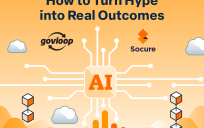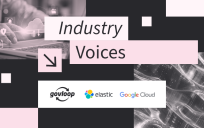For government agencies tasked with everything from managing massive datasets to delivering essential public services, AI offers some game-changing advantages. But the key to success lies in how it’s applied. Agencies that are using AI strategically are seeing benefits like improved resource allocation, faster decision-making, and even better constituent services.

So, what does “making the most of AI” really mean? It’s about ensuring that your AI initiatives align with your agency’s mission, that the right data is fueling your systems, and that your team is set up to actually use AI effectively.
Let’s take a look at who’s already making the most out of AI. Take the Internal Revenue Service (IRS), for example. The agency has put AI to work by automating the processing of tax documents. Machine learning algorithms now handle the categorization and extraction of information from these documents, which cuts down on manual data entry and reduces mistakes. This means faster processing times and a boost in overall efficiency!
The Social Security Administration (SSA) is also making strides with AI. It’s deployed chatbots that handle routine inquiries and guide users through various processes. These AI-powered assistants manage simple tasks and troubleshooting, which improves customer service and allows human staff to focus on more complex issues. It’s a win-win: faster response times and more efficient use of resources.
By automating repetitive tasks, improving predictive capabilities, and enhancing customer service, AI opens up exciting possibilities for boosting efficiency and effectiveness in government operations.
Common Pitfalls to Avoid
Many agencies are eager to integrate AI but might not know where to start — or worse, they implement it in a way that fails to deliver results. Here are a few common pitfalls:
- Not tying AI to specific goals: AI is most effective when it’s aligned with a clear objective. Whether you’re trying to streamline processes or improve the accuracy of predictions, make sure you know exactly what you want AI to achieve. The IRS, for example,had a clear objective to cut down on manual data entry and reduce mistakes.
- Lack of quality data: AI depends on data to work. Without clean, relevant, and comprehensive datasets, even the most advanced AI system will struggle to perform. Agencies need to invest in good data practices and ensure that the information being fed into AI systems is up to date and relevant.
- Neglecting the human element: AI can do amazing things, but it’s not a magic solution that works in isolation. The most successful AI initiatives incorporate the insights, oversight, and judgment of human staff. Your team should understand how AI fits into their workflow and how to leverage its results for better decision-making. It’s also often not a replacement for human staff. We must continue to value employees and know when to take a step back from AI.
The Future of AI in Government
AI’s potential in the public sector is just beginning to unfold. The future of AI holds exciting possibilities, from uncovering patterns in massive datasets and automating routine tasks to enhancing citizen engagement. To fully leverage AI’s capabilities, government agencies need to remain adaptable and open to technological advancements. It’s essential to integrate AI tools in a way that aligns with the agency’s goals and complements human expertise. Continuous learning and development are crucial, providing staff with the training needed to work effectively alongside AI systems. We can’t predict where AI will take us in the next five or fifteen years, but now is the time to get on board and make the most of our AI at your agency.
Tim is a seasoned executive with over 10 years of experience leading IdeaScale’s Public Sector and Defense business. He’s a trusted resource with deep knowledge of government and defense community innovation challenges, particularly in the area of nuclear nonproliferation. Tim spearheads global expansion efforts in LATAM, Brazil, MENA, and Sub-Saharan Africa, fostering a culture of innovation across the public sector. Fluent in Chinese and an avid traveler, Tim brings a global perspective to complex challenges. His expertise lies in guiding government agencies to leverage technology to solve critical missions.





Leave a Reply
You must be logged in to post a comment.